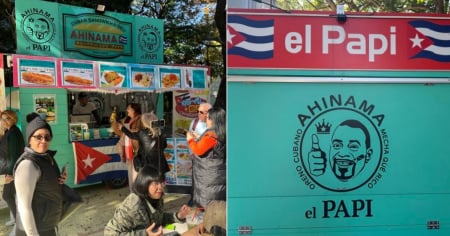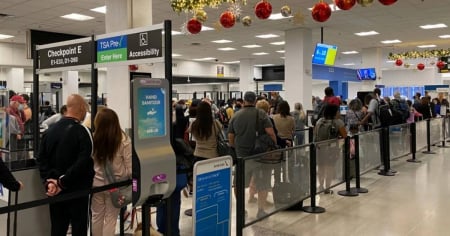A Cuban woman recently shared with her TikTok followers the difficult experience she had at Miami Airport in mid-October when she was taken to the "Immigration room" while trying to make her connection for her journey to Texas, where she lives.
The internet user identified on social media as "Kenia cubana texana" clarified that she arrived in the United States through family reunification, meaning she did not enter via the border or any similar means.
However, she states that this did not exempt her from feeling "pressured and harassed" during an extensive interrogation at Miami Airport.
The young woman mentioned that she traveled to the island for just three days, from December 13 to 16, to see her three grandparents.
He says he hadn't been to Cuba in almost a year, but during the intense and intimidating interrogation, they asked him how many days he spent on the island, what his purpose was, and whether he had brought back alcoholic beverages, medicines, and food from the island. They also inquired if he was carrying cash.
The young woman denied having brought any money, but she did admit that she had two bottles of rum, sweets, and some medicine in her luggage, all of which belonged to her.
She recounts that she was put under oath and that her luggage was taken away for a thorough inspection.
Finally, they took away his medications, broke the bottles, and threw out the sweets.
“They told me we don’t want anything from communist Cuba here. I went through the worst moment of my life. They told me that nothing can be brought from Cuba here, that nothing is allowed,” Kenia stated.
The young woman specified that they took her fingerprints and that she felt treated like a "criminal." They even searched through her purse, where she had a personal note from her boyfriend.
"Sir, the situation with Cuba is dire, and I assure you, I have nothing to do with it; I hadn't been to Cuba in a year. I went to see my three grandparents," he reiterated as a warning, in a message primarily aimed at individuals who may have more delicate immigration situations.
Kenia explained that the Immigration officer who attended to her wrote extensively on a computer and that the dreaded "little room" was filled with travelers like herself, filling out documents.
The young woman mentioned that if she decides to return to Cuba at any point, she will not bring anything at all because doing so puts her residency, entry into the United States, and many other things at risk.
Kenia described it as "the worst trip of her life," and she stated that the immigration process took so long that she nearly missed her connection to Texas.
In the comments section of her post, many Cubans criticized the young woman for bringing drinks, food, and even medicine from Cuba. Some even questioned what medicines could be brought from the island if there are "not even aspirin" available there.
Another group of internet users were more understanding, expressing their gratitude to Kenia for her recommendations or advising her never to bring anything from Cuba again to avoid a negative experience like the one described.
In recent months, several Cubans with legal residency in the United States have reported being questioned by immigration authorities at Miami Airport.
In March, in an audio message sent to journalist Mario J. Pentón, a Cuban resident in the U.S. recounted that he was warned at the Immigration offices at Miami Airport about the possibility of losing his immigration status after returning from his third trip to Cuba within a span of three months
In early March, a Cuban woman with an I-220A who obtained her residency through the Cuban Adjustment Act revealed that upon returning from a trip to Cuba at Miami Airport, an Immigration officer threatened her with the possibility of losing her residency if she continued to travel to the island.
In statements to journalist Javier Díaz for Univision, the woman explained that she had applied for residency under a political asylum case but later closed that case once she obtained her residency through the I-220A. However, the officer was emphatic in telling her that anyone who enters through the border should not return to Cuba.
At the end of February, the testimony of another Cuban emerged, who had been living in the United States for nearly 18 years and received a similar warning from an Immigration officer after returning from a trip to the Island with his wife and children.
Despite telling him that he had arrived by boat, that he had applied for the Cuban Adjustment Act, and that he had been in U.S. territory for almost 18 years, where he held a permanent Green Card, the Immigration officer insisted on advising him not to return to the island.
In November of last year, U.S. Senator Marco Rubio questioned the situation of Cubans who are welcomed as refugees in the United States and then travel back to Cuba, the country from which they supposedly fled to escape political persecution.
Addressing the Secretary of the Department of Homeland Security, Alejandro Mayorkas, the senator raised the issue of Cubans who obtain refugee status in the U.S. and, one year later, are on vacation in Cuba, the country they allegedly fled from for political reasons.
Archived in:






